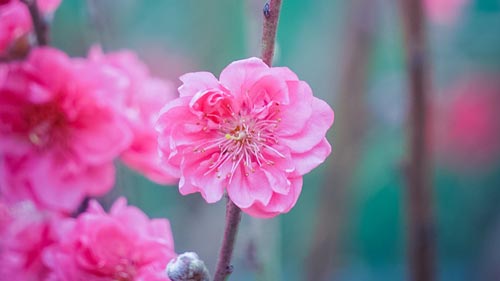1
雅思 口语描述家乡
雅思口语考试如果要你自己介绍一下你的家乡,你会说些什么呢下面是雅思口语描述家乡的方法,跟小编一起来了解下吧:
在哪里
位于,坐落在: lie / be located/ situated in

在中国东/西/南/北部: in the east / west /south / north of China
(若不加the,则表示在China的外部)
在中国东北/西南:in the northeast / southwest of China
毗邻: to be adjacent to
地形描述
高原:altiplano(专业名词,还可特指阿尔蒂普拉诺高原) plateau(通用名词)
平原:plain
盆地:basin
山区:mountainous area
气候特点
四季分明:distinct seasons
(气候)温和的: mild
宜人的天气: temperate weather
城市类型
旅游城市 : tourist city
工业城市 : industrial city
海滨城市 : coastal city
海岸线 : coastal line
工业港口 : industrial port
珠江三角洲 : Pearl River Delta
黄河 : the Yellow River
海港 : seaport
城市特点
江南水乡景色 : Southern Chineseriver-side scenery
苏州园林 : Suzhou gardens
古城 : ancient city
历史名胜 : historical attractions
欣欣向荣的 : flourishing
繁荣的 : prosperous
建筑风格
独特的建筑:unique architecture
高楼大厦:skyscraper
现代建筑: modern architecture
欧式建筑:European stylearchitecture
中式建筑:Chinesearchitecture
融合:combination
居民特点
拥有…的人口: have a population of…
人口众多的城市: a populous city
当地居民:local residents
出生地:birthplace
人口多的:heavily populated
热情的:hospitable
友好的:friendly
勤劳的:industrious
高尚的:noble
纯朴的:unsophisticated
待人尊敬: treat people with respect
2
雅思口语描述植物
Part 1
1. 关于Trees类话题
在这一类话题中考生会被问及以下问题:Do you like to go to the forest? / Have you ever planted any trees? / Do you think that people should plant trees? /What are the effects of trees? / Are there many trees in your hometown? 考生们在答题时需要注意,在回答Have you ever planted any trees? 时,考生要摒弃以往可能出现的回答,比如Yes, I did it. / No, I have never done that before. 因为考官旨在考察考生的英语语言能力,而不是真的想知道考生是否之前有种树经历。
所以,考生在回答Part 1部分时,给出3到4句话比较合适,也就意味着考生在答题时需要进行适当的扩充。那么对于这道题,考生可以结合Arbor Day进行作答。如果考生们对英语国家文化比较了解,不难发现Arbor Day表示每年的4月10日,也就是英语国家的植树节。例如对于该问题考生可以参考这样的答案:Yes, I did that before. I vividly remember that I planted trees with my bros on the last Arbor Day. And, you know, we did that in a civic park. That is really interesting.

2. 关于Flower类话题
关于花类话题,有以下常见问题:Do you like flowers? / What are the popular flowers in your country? / On what occasions do Chinese people send flowers to others? / What kind of flowers do you like most? / What special meanings do different flowers mean? 对于花类话题,考生们如果考前不做好充分准备,答案比较容易出现重复。在课堂练习中不难发现,提到花类的话题,考生们对于词汇比较有所欠缺,答案非常有限。比如,考生被问及到What kind of flowers do you like most?
大家通常会把答案集中在rose上。但是考官面对这样千篇一律的答案,非常难给出高分。所以建议考生们在备考前积累花类词汇,对于花名进行了解。在这里给考生们列举一些常见花名,供大家参考作为答题素材:carnation康乃馨 / peony牡丹 / lotus荷花 / violet紫罗兰 / orchid兰花。大家也可以给出这样的答案:You know, I am not a kind of expert in the field of flower. But if you ask this question, I wanna say that my favorite flower is peony which is our national flower. That is very meaningful in China.
Part 2
关于Part 2部分出现的植物类话题,在此列出近两年的常考题目来进行分析。
Describe an important plant in your country (such as vegetables, flowers, fruits, trees)
You should say
What plant it is
How you know it
Why it is important
Explain how you like it
Describe a kind of flower that you like
What flower it is
What it looks like
Where the flower usually grows
Where you have seen this kind of flower
Why you like it
从这两道关于植物类的话题,大家完全可以找出两道题的共同点,也就是找出共同素材来对题目进行解答。雅思口语的题目当中,不断出现老题回归、旧题改编等形式,面对种种的“换汤不换药”,考生们可以冷静地分析下考试的内容,从容应对。例如,在这两道题中大家分析后发现只要找寻flower这个要素,便抓住了两道题的共同切入点。那么在这里,笔者给考生们总结下在花这个部分准备时需要注意的几点:
1. 素材的选择需要创新性。考生在雅思口语中想要取得高分或者令自己满意的分数,除了要具备良好的英语语言能力以外,素材的新颖性和创新性尤其需要注意。所以,考生们应该抛开rose这种完全被用滥的话题(正如前文所提到的一样),去找寻有创意性的素材在口语备考和答题时进行使用。
2. 分类词汇的储备。关于flower这个话题,除了花名,考生还需要对分类词汇做好必要的准备,毕竟在考题中还设置了what it looks like这样的问题。对于花的外观描述,会涉及到花朵(bloom/blossom)、花瓣(petal)、花蕾(bud)、花香(fragrance)这些词汇的运用。所以,考生们需要对分类词汇进行整理,储备有效词汇。
3. 注重素材和生活之间的联系性。很多考生在课堂上对于题目当中涉及“why do you like it”或者“how do you like it”的问题会产生困扰。因为他们认为自己对于花类词汇并不爱好,根本无法答题。其实不然,如果考生足够细心和有想象力,那么一定可以在碰及这样的问题的时候,很好地将素材和生活联系起来。
举个例子,如果考生在这里运用的素材是jasmine, 那么在答题的时候不妨大胆地将jasmine和生活中的jasmine tea相连:The reason why I like jasmine is that, you know, jasmine tea is my favorite drink. 既然找到并且建立了素材和生活之间的联系,那么后面考生将可以顺利的对jasmine tea进行阐述,也就是找到了原因的依托点。
3
雅思口语考试如何算分
我们都知道,雅思考试的总分和每个单项的最高分都是9分。每个考生的最后分数都是由四项分数之和除以四得来的平均分。例如:
1)6.0分说明其四项之和是24分。24=6+6+6+6,也就是说,需要每个单项都考到6分,不能存在任何一个弱项。
2)6.5分说明其四项之和是26分。26=7+7+6+6,也就是说,需要两个7分的强项。
那么,如果考到的不是24或者26分,而是23或者25分怎么办?
1)23/4=5.75,就约等于6.0分。23=6+6+6+5=6+6+5.5+5.5,也就是说,在总分少考一分的情况下,同样可以考到6.0分。这样的压力会小一些,因为可以允许考生存在一个弱项。
2)25/4=6.25,就约等于6.5分。25=7+6+6+6=6.5+6.5+6+6,也就是说,在总分少考一分的情况下,只要达到一个7分三个6分,或者两个6.5加上两个6分,就可以获得理想中的6.5分。
从以上计算方法可以看出来半分的重要性了。以前,只有阅读和听力两项存在半分,所以只有这两项才有可能考到5.5或者6.5。但是,以后考生的选择会大一倍,可以从四项中任意选择两项考到半分,而另两项考到整分,就能取得理想的成绩。
还有,目前很多国外的大学除了对总分有6.0或者6.5的要求之外,还对单项规定了不能低于6的规定。以前由于写作和口语没有半分,所以要么是5,要么是6。这样对于一些能力不稳定的考生而言就比较难以把握。而如果存在半分的话,那么水平介于5与6分之间的考生就有可能考到5.5这一最低要求。
所以,写作和口语采取半分制度会给考生更大的选择。
但是,由于存在半分制度,也许以前你能够考到6或7的考生,可能由于细微的差别,就只能考到5.5或6.5,从而可能影响总分。这也是大家不得不考虑的问题。所以,大家还是需要对写作和口语做充分的准备,才能做到趋利避害。
4
雅思口语如何到7
Speaking Band 5.0
The candidate tries tokeep the speech flowing but their hesitation gets in the way.The responses are rather short, the candidate tries to use linking words but they seemforced. Only simple sentences are fluent, in the more complex ones the coherence is much worse. There arerepetitions of the same words and the same sentence structures. The candidate’s pronunciation is not very good, which includes incorrect stressin words.
考生尽力不让对话中断,但是它们的停顿时有发生。答案较短,考生尝试使用连接词,但是很生硬。只有简单句子能够流利,句子越复杂,连贯性越差,不断重复同样的词和句子结构。发音一般,单词和句子重读有错误。
Speaking Band 5.5
The candidate gives short answers, is not willing to talk at length. Responses answer exactly what he’s being asked. He hesitates a little and sometimes uses linking words incorrectly. His vocabulary is simple but sufficient for him to talk on the subject and make himself clear. The grammar of simple sentences is mostly accurate, but there are several errorsin more complex sentences, many of which are left incomplete. There are many mispronounced words.
考生的回答较短,也不愿意多说。只对问题作直接回答,没有扩展。有些停顿,偶尔会把连接词用错。词汇简单,但是能够简单表达自己。简单句语法基本准确,但复杂句语法错误多,而且句子不完整。有很多读错的词。
Speaking Band 6
The candidate is willing totalk at length, not always directly answeringthe question. The speech is mostly fluent with some hesitation and repetition. Usage of linking words (such as ‘however’, ‘on the one hand’, ‘then again’,etc) is there, but not always they are used appropriately or accurately. The vocabulary is large enoughfor the candidate to speak on the given topic and he is easy to understand,even if there are some grammatical errors.The candidate uses both simple and complex sentence structures; but it shows that the grammar in the complex ones is harder for him to control. The pronunciation is mostly correct with occasional errors.
考生有意愿给出较长回答,但是有时跑题。基本流利,偶尔停顿和重复。有使用连接词,像 however,on the other hand, then, again等,但不是每次都用对。词汇丰富,足够详细描述话题,也很容易理解,但存在语法错误。简单句和复杂句能够结合使用,但是复杂句没有完全掌握。发音较少出错。
Speaking Band 6.5
The candidate cantalk at length without much hesitation or repetition. His sentences are easy to follow– the information has a sequenceand he uses linking words to move smoothlyfrom one idea to another. His vocabulary includes not only simple but also sophisticated words on the subject, even if sometimes the choice of a word is inappropriate, the meaning is perfectly clear. Strong accent gets in the way of correct pronunciation.
考生能够没有多少停顿和重复的情况下给出较长答案。答案容易理解,有逻辑,有顺序,能够使用连接词连接自己的观点。词汇有简单,也有复杂词汇,尽管有时候用的不准确,但是意思是清楚的。发音正确,但有口音。
Speaking Band 7
The candidate speaks smoothlywithout much effort. The linking words are used naturally and in the right places. He doesn’t cover the whole subject in his answers. His vocabulary is appropriate but not sophisticated and doesn’t show variations, the language isfluent but relatively simple. He uses someidiomsand sometimes does that inappropriately. The control of grammar is good, the mistakesare rare. His pronunciation is good and the accent doesn’t get in the way.
考生可以不费力的说得流利。连接词用的很自然,也用在对的地方。没有完全回答问题。词汇准确,但是复杂词汇缺少替换,语言流利但是相对简单。有时使用成语,但并不完全正确。语法掌控好,几乎没有错误。发音好,没有口音。





